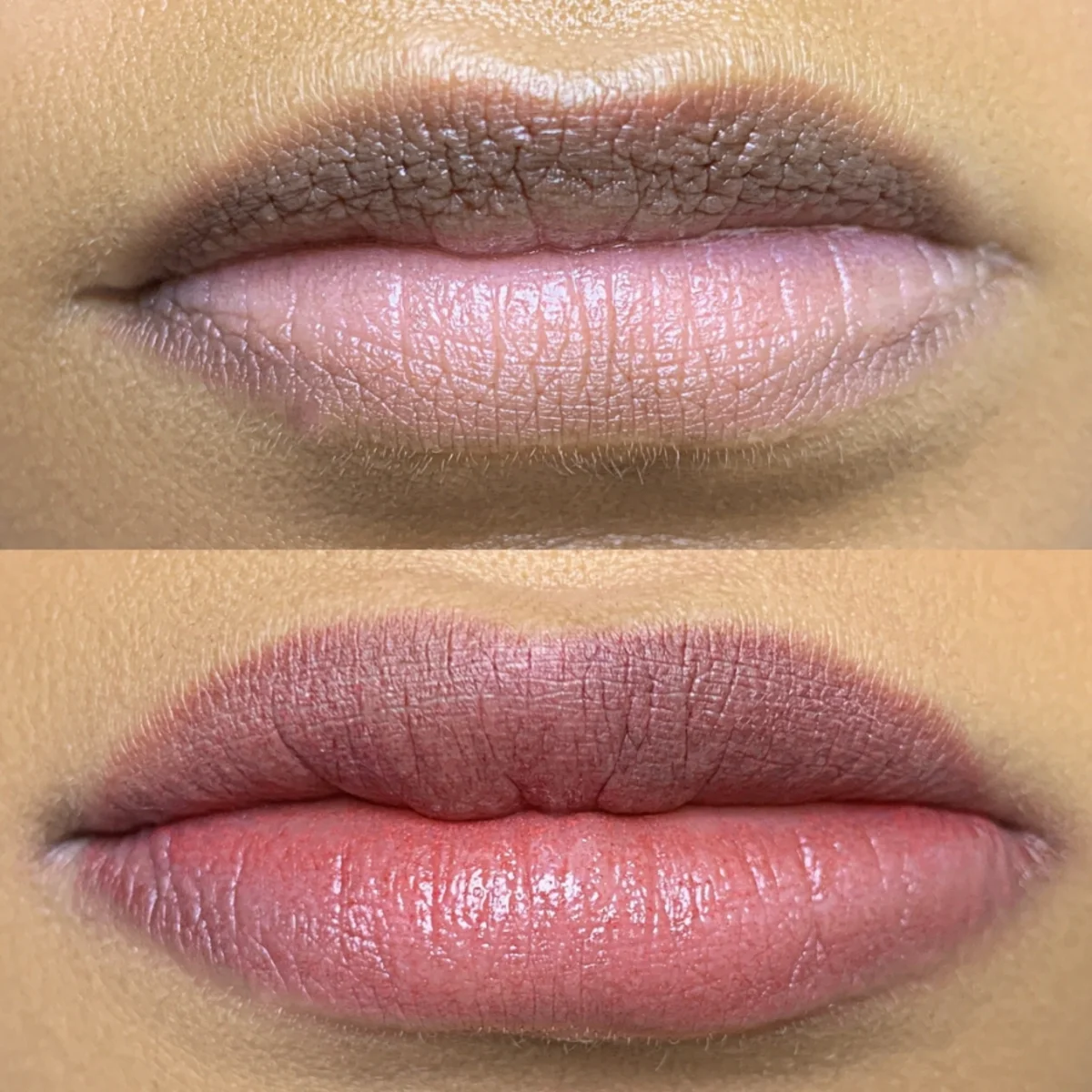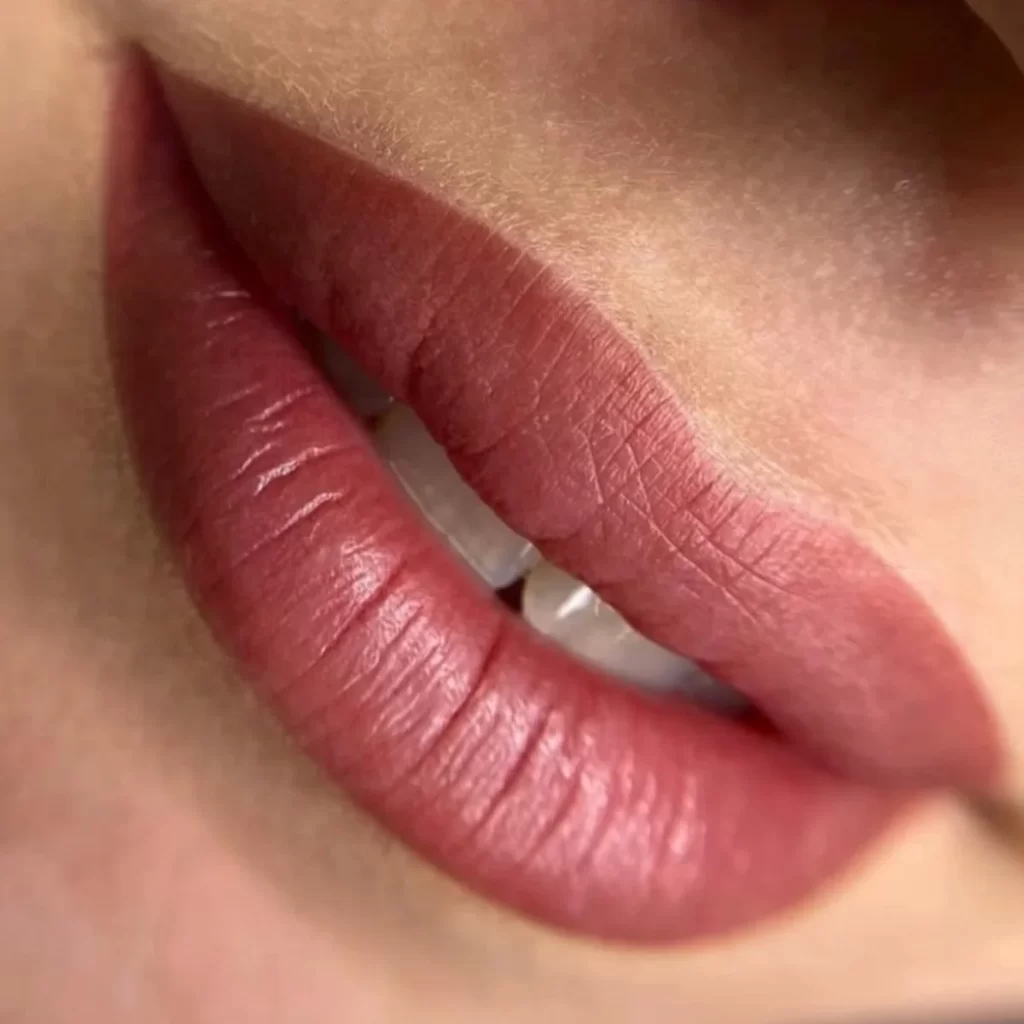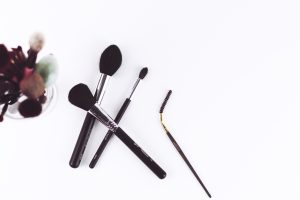ollow pre- and post-care instructions for optimal results and lip tattoo longevity. Every client’s skin heals differently, so properly caring for your lips during and after healing is essential.
Prepare lips before a tattoo
It is essential to strictly follow pre-care instructions to minimize bleeding and skin sensitivities during the procedure. Excessive bleeding and sensitivity can result in diluted pigment colour and poor outcomes.
- It is necessary to consult with your physician for a prescription of antiviral medication such as Valtrex, Zovirax, or other antiviral medicines before and after the procedure to prevent a herpes outbreak, especially if you have had chickenpox, fever blisters, or cold sores. It is essential to start taking the medication two days before the procedure and continue for two days after.
- The skin should be clear of irritations, such as blemishes, eczema, and psoriasis.
- Patients planning to get a Cosmetic Tattoo should not have been on Accutane medication for at least one year prior.
- It is recommended to wait at least six weeks after getting lip fillers before considering additional lip tattoo, as there is a risk of poor colour retention and pigment migration.
- Please avoid taking Fish Oil, Vitamin C, Glucosamine, Evening Primrose Oil, or Ginger one week before your appointment. These supplements can thin the blood and affect the outcome of the pigment implantation process. Failure to follow this guideline may result in a patchy healed result.
- Avoid using anti-aging, skin brightening, or anti-acne skincare products before your appointment. These products, such as those containing AHA, Vitamin A, or Retinol, can cause patchy healing of your cosmetic tattoo. Wait at least 30 days before your appointment without using these products. After your tattoo fully recovers (around six weeks after your final session), you can resume your regular skincare routine.
- Please refrain from scheduling facial treatments such as microdermabrasion, microneedling, peels, or laser treatments at least 4 weeks before your appointment.
- It is recommended to wait six months after a lip implant before considering any further procedures.
- Avoid taking any blood thinning medication or supplements for at least 72 hours before your procedure unless advised otherwise for health reasons. Consult your doctor before stopping medications such as Ibuprofen, Aspirin, Advil, Niacin, Voltaren, and Indocid, as well as supplements like Prenatal Vitamins, Vitamin E, or Nutritional Shakes. If needed, you can take Tylenol for low pain tolerance.
- Refraining from what you’re doing on the day of the procedure is recommended.
- It is recommended to avoid sun tanning or using tanning beds for at least two weeks before the procedure. If you arrive with a sunburn, you must reschedule and lose your deposit. Sunburned skin can affect the procedure’s outcome as the skin exfoliates and takes away the pigment. Tanned skin is considered damaged skin and may not heal properly.
- It is required for scars resulting from surgery or injury to be fully healed for a minimum of one year before undergoing service.
- Refrain from consuming alcohol within 24 hours before your procedure.
- Avoid consuming coffee or other caffeine products within 24 hours.
- Awareness that sensitivity may increase during your menstrual cycle is essential.
- Getting ample rest and staying hydrated by drinking plenty of water before the procedure is recommended.
Aftercare for lip tattoos
What can be expected immediately after the procedure?
After applying lipstick, your lips will appear bold and slightly more significant due to the colour. This effect will only last for a day or two. Over the next three days, the colour will fade by up to 50%, and your lips will return to their standard size. Colour loss will start inside your lips and fade towards the edges.
As the crust develops, it will gradually flake off, exposing a lighter and more natural hue.
During touch-up appointments, clients frequently request a darker shade. It is recommended to be conservative during the initial procedure, as adding more colour is more accessible than removing it.
After the procedure, it is recommended to consume liquids through a straw and to choose foods that can be eaten with a fork to avoid touching the lips.
Appointment Scheduled for Day 1
Apply an ice pack with a protective barrier for 10-minute intervals during the first 24 hours. Ice can be applied every hour if desired, but avoid direct contact with the skin.
(Days 1 – 10)
Possible symptoms after the treatment include redness, swelling, and itching, which are common and temporary.
- Swelling and redness.
- Tenderness.
- Some flaking and mild itchiness may occur as the lips heal.
- Dry skin can persist for a period of up to 3 weeks.
- During this initial 12-48 hours, as your skin forms a protective scab and lymph secretion is active, it is customary to see fluid or ooze on your skin. It is important to gently pat this fluid with a water-wet wipe and then dry it with a clean paper towel to prevent crusting and allow your skin to breathe.
- Keeping the lips clean and moisturized with the provided ointment is essential. Avoid disrupting the crust and allow it to fall off naturally. Some oozing may occur for a few days.
- To clean your lips, use the water wipes provided to compress them in the morning, midday gently, and at night. After cleaning, apply a thin layer of the ointment provided with a Q-tip or clean hands, lightly touching your lips. This should be done several times daily for at least seven days after the procedure to reduce the risk of infection. Avoid letting your lips become dry, as it may affect the healed colour. Be gentle and avoid aggressive movements on the skin. Never apply the ointment to a wet tattoo.
- After getting lip filler injections, the lips may peel for about a week. It’s best to let the skin flake off naturally. Picking or pulling off skin prematurely can lead to pigment loss and damage to deeper tissue. The lip liner edges will be the last to come off; pulling them off early can result in uneven lines or indented scars.
- Colour may not be evident during the peeling process, but it will become more apparent by the second week and continue to clarify until five weeks.
The following should be avoided
- Avoid rubbing, picking, or scratching the area as it may cause uneven healing and increase the risk of infection, potentially leading to scarring. Allow any scabs or dry skin to exfoliate naturally.
- While your lips heal, avoid stretching them by smiling widely or puckering them while smoking. These movements may cause friction between your skin and inflamed lip edges. The skin on your lips is delicate, similar to the mucous membrane inside your mouth, and is not as strong as normal skin.
- Avoiding direct sun exposure or tanning beds for four weeks following the procedure is recommended. Wearing a hat and sunglasses when outdoors is also advised.
- It is recommended to refrain from smoking for approximately one week while your lips are healing.
- Avoid kissing, rubbing, or friction on the treated area until it is fully healed to prevent colour loss.
- Refrain from heavy physical activity, including exercise, sports, swimming, sauna, steam rooms, jacuzzi, and prolonged hot showers for ten days.
- Avoiding direct water pressure on the treated area for ten days while showering is essential. Aquaphor can be applied to cover the lips.
- Please refrain from applying skincare or cosmetics on the treated area. Be cautious when using foundation or powders.
- Do not use cleansers or moisturizers with Retin-A, glycolic acids, anti-acne ingredients, or AHA’s/BHA’s on the treated area.
- It is recommended to refrain from consuming hot, spicy, salty, and acidic foods for the first two weeks following a procedure and to drink liquids through a straw for three days. It is also advised to avoid constantly wiping your lips with a napkin or licking them, as this may hinder the healing process.
- It is recommended to avoid using toothpaste products with whitening properties for ten days, as this can potentially bleach the colour of your lips.
- Avoid undergoing bleaching, waxing, electrolysis, or laser hair removal treatments near your enhancement area. Avoid for two weeks.
- It is recommended to avoid using exfoliants and acids such as glycolic acid, alpha hydroxy acids, lactic acid, salicylic acid, fruit acid, and Vitamin A on the tattooed area for 30 days as they can cause premature fading.
- Using a clean pillowcase is recommended, and you should avoid sleeping on your face for the first ten days after a cosmetic procedure.
- It is recommended to avoid scheduling facial treatments such as facials, microdermabrasion, microneedling, peels, or laser treatments for at least four weeks, as they may affect the pigment.
- Excessive alcohol consumption may impede the healing process of wounds.
- Avoid using Blistex, Carmex, or Chapstick during the healing process.
- It is recommended to refrain from operating open-air vehicles, including convertibles, boats, bicycles, or motorcycles.
- Avoid activities involving heavy household cleaning, such as garage or storage cleaning with a lot of airborne debris, at this time.
- Refraining from getting cosmetic lip injections for at least three weeks before your appointment is recommended.
Note

- Procedures must go through the stages of healing, peeling, and fading. The healing period typically lasts around ten days but can be prolonged by factors such as a compromised immune system, stress, and poor diet.
- Clients with sun damage, scar tissue, or implants may experience limited results.
- Hyperpigmentation is a potential occurrence for any lip client, regardless of prior warning.
- Your skin needs 28 days to slough off and regenerate to see results. Even with proper care, some areas may look uneven or patchy, which is expected as your artist cannot control your natural skin regeneration. A complimentary touch-up is included after 6-8 weeks to fine-tune your enhancement and achieve the desired effect.
- Healing results can differ for each client. The healing process is out of our control. It may take 1 to 3 sessions for lips, being a muscle, to complete the procedure. The outcome of the healed lip colour is unpredictable. Some may have an intense colour, while others may have only slight colour uptake. Results will vary from person to person.
- Once your lips are healed, you can start wearing lipstick again. It’s recommended to use a new lipstick after any lip treatments.
Care for a long time
Cosmetic tattoos typically last between 3-5 years, with the help of a touch-up session.
- Regular touch-up appointments are necessary to keep your lips’ shape and colour depth. Without maintenance, the colour will lighten over time. Fading can be influenced by skin type, lifestyle, sun exposure, pigment colour, broken capillaries, and iron deficiency. To ensure your lips always look their best, it is recommended to schedule a touch-up once a year for optimal results.
- To protect your cosmetic tattoo, use sunscreen on your lips when in the sun for a long time. Sun exposure can cause fading over time. Smokers, sun lovers, or those with distressed skin may not have ideal results. Sun exposure speeds up colour fading. Apply lip balm with SPF daily on the tattooed area to maintain colour intensity.
- Before undergoing a chemical peel, laser procedure, or MRI scan, inform the technician about your cosmetic tattoo, as it contains iron oxide in the pigments. Special care should be taken to prevent any impact on the tattooed area. If you are considering laser treatments, inform your specialist to avoid the pigmented area, as the laser may cause the pigment to darken.
- Retin-A/Tretinoin, hydroquinone, or any other rapid skin exfoliation on the brow area can cause premature fading of cosmetic tattoos.
- The repeated use of chemical peels, acid peels, or brightening products on the forehead area can lead to premature fading of permanent eyebrows.
- Exfoliating cleansers, scrubs, cleansers with acne-fighting ingredients, or products containing acids may lead to rapid skin exfoliation with pigment, potentially increasing the risk of premature fading.


